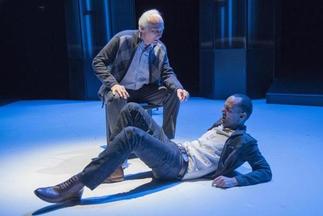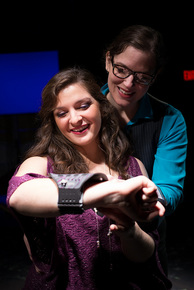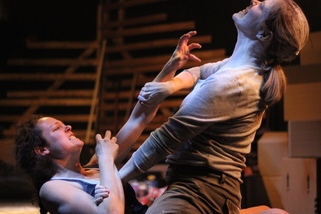 A Number by Caryl Churchill, produced by New Repertory Theatre.
A Number by Caryl Churchill, produced by New Repertory Theatre. There is a specter haunting the American Stage: the specter of science fiction. As a genre, science fiction has had a home for years in film and TV, but it is only in the last ten years that the genre has made an appearance on the stage. Companies like Other World Theatre in Chicago, Quantum Dragon Theater in San Francisco, and Science Fiction Theatre in Boston have all formed in the last few years, specifically to produce science fiction for the American stage.
Before we go any further, let’s define science fiction. Wikpedia defines science fictions as: Science fiction (abbreviated SF or sci-fi) is a broad genre of fiction that often involves speculations based on current or future science or technology.
It’s a broad brush. Science fiction can run the gauntlet of Frank Herbert’s interstellar Dune Saga to George Orwell’s 1984. For a long time, science fiction was considered too lowbrow, often relegated to pulps and comics. The theatre by comparison has always been considered more highbrow and so the mixing of the two can seem to be contradictory.
Before we go any further, let’s define science fiction. Wikpedia defines science fictions as: Science fiction (abbreviated SF or sci-fi) is a broad genre of fiction that often involves speculations based on current or future science or technology.
It’s a broad brush. Science fiction can run the gauntlet of Frank Herbert’s interstellar Dune Saga to George Orwell’s 1984. For a long time, science fiction was considered too lowbrow, often relegated to pulps and comics. The theatre by comparison has always been considered more highbrow and so the mixing of the two can seem to be contradictory.
 What Once We Felt by Ann Marie Healy, produced by Flat Earth Theatre, photo by Jake Scaltreto.
What Once We Felt by Ann Marie Healy, produced by Flat Earth Theatre, photo by Jake Scaltreto. So what is Science Fiction Theatre? It can be a topic of debate, but any play that takes place in the future, however near, can be classified as science fiction, and any play that deals with the ramifications of technology or a change or breakdown in society and government can be classified as science fiction.
The idea of what can be performed on stage is changing. We are seeing plays like Bella Poynton's The Aurora Project, which takes place on a space ship traveling the galaxy, or plays like Walt McGough’s Chalk about a mother and a daughter hiding in a barn during an alien invasion. Both are very different but are without question science fiction. Odds are Boston theatregoers have seen a science fiction show and haven’t even realized it. A Number by Caryl Churchill (just produced by New Repertory Theater) deals with human cloning; Flat Earth Theatre’s production of Ann Marie Healy's What Once We Felt takes place in a dystopian city, and later this year the Lyric Stage Company will produce Ann Washburn’s Mr. Burns; a Post-Electric Play.
Science fiction is never really about the future. It’s almost always about the present. It’s a way for us to talk about the fears and anxieties we have as a society. H.G. Wells wrote The War of the Worlds at the height of British Imperialism, the Cold War saw a rise in stories about a nuclear apocalypse, and we’re slowly seeing stories now about the effects of climate change. What makes theatre so different than TV or film is that it is a communal act. You go to the theatre to be with other people, to watch actors perform in front of you. As a community we can engage with these issues together. It doesn’t matter whether the play takes place in an American living room or a Martian settlement. It’s this sense of collaboration and community that keeps me writing for and working in the theatre.
The idea of what can be performed on stage is changing. We are seeing plays like Bella Poynton's The Aurora Project, which takes place on a space ship traveling the galaxy, or plays like Walt McGough’s Chalk about a mother and a daughter hiding in a barn during an alien invasion. Both are very different but are without question science fiction. Odds are Boston theatregoers have seen a science fiction show and haven’t even realized it. A Number by Caryl Churchill (just produced by New Repertory Theater) deals with human cloning; Flat Earth Theatre’s production of Ann Marie Healy's What Once We Felt takes place in a dystopian city, and later this year the Lyric Stage Company will produce Ann Washburn’s Mr. Burns; a Post-Electric Play.
Science fiction is never really about the future. It’s almost always about the present. It’s a way for us to talk about the fears and anxieties we have as a society. H.G. Wells wrote The War of the Worlds at the height of British Imperialism, the Cold War saw a rise in stories about a nuclear apocalypse, and we’re slowly seeing stories now about the effects of climate change. What makes theatre so different than TV or film is that it is a communal act. You go to the theatre to be with other people, to watch actors perform in front of you. As a community we can engage with these issues together. It doesn’t matter whether the play takes place in an American living room or a Martian settlement. It’s this sense of collaboration and community that keeps me writing for and working in the theatre.




